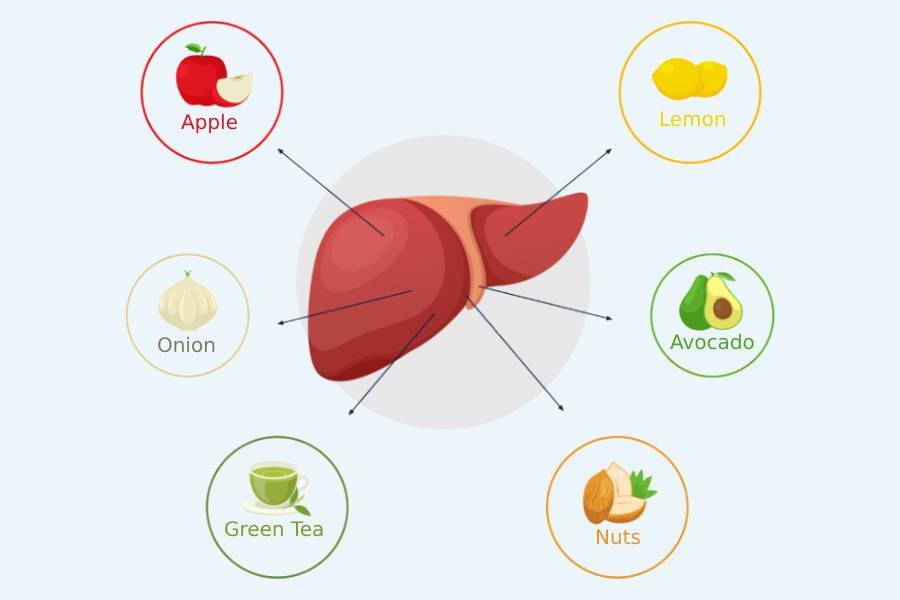
Health Tips And Precautions
- Avoid alcohol and tobacco use.
- Maintain a healthy weight.
- Eat a balanced diet rich in fruits, vegetables, and whole grains.
- Get regular exercise.
What is Liver And Pancreatic Diseases Diet?
The liver and pancreas play crucial roles in digestion and metabolism, and their health is vital for overall well-being. However, certain liver and pancreatic diseases can affect the body's ability to process nutrients, making it necessary to adopt a specialized diet. The liver and pancreatic diseases diet focuses on providing adequate nutrition while minimizing strain on these organs. It emphasizes the consumption of lean proteins, whole grains, fruits, and vegetables, and limits processed foods, sugary drinks, and excessive saturated fat.
The specific dietary recommendations vary depending on the underlying condition. For example, patients with liver disease may need to restrict their protein intake to prevent ammonia buildup in the blood, while those with pancreatic insufficiency may require enzyme supplements to aid digestion. Dietitians play a vital role in tailoring meal plans to meet individual needs and monitoring progress. By adhering to a liver and pancreatic diseases diet, patients can manage their symptoms, improve their overall health, and reduce the risk of further complications.

Health Tips And Precautions
- Avoid alcohol and tobacco use.
- Maintain a healthy weight.
- Eat a balanced diet rich in fruits, vegetables, and whole grains.
- Get regular exercise.
What is Liver And Pancreatic Diseases Diet?
The liver and pancreas play crucial roles in digestion and metabolism, and their health is vital for overall well-being. However, certain liver and pancreatic diseases can affect the body's ability to process nutrients, making it necessary to adopt a specialized diet. The liver and pancreatic diseases diet focuses on providing adequate nutrition while minimizing strain on these organs. It emphasizes the consumption of lean proteins, whole grains, fruits, and vegetables, and limits processed foods, sugary drinks, and excessive saturated fat.
The specific dietary recommendations vary depending on the underlying condition. For example, patients with liver disease may need to restrict their protein intake to prevent ammonia buildup in the blood, while those with pancreatic insufficiency may require enzyme supplements to aid digestion. Dietitians play a vital role in tailoring meal plans to meet individual needs and monitoring progress. By adhering to a liver and pancreatic diseases diet, patients can manage their symptoms, improve their overall health, and reduce the risk of further complications.
Types Of Liver And Pancreatic Diseases Diet
Non-Alcoholic Fatty Liver Disease (NAFLD)
A diet for NAFLD should focus on reducing overall caloric intake, especially from saturated fats and simple sugars. It should include a variety of fruits, vegetables, whole grains, lean proteins, and healthy fats.
Alcoholic Liver Disease (ALD)
The primary treatment for ALD is abstinence from alcohol. A diet for ALD should focus on reducing overall caloric intake, especially from saturated fats and simple sugars, and include a variety of fruits, vegetables, whole grains, lean proteins, and healthy fats.
Hepatitis
A diet for hepatitis should focus on reducing overall caloric intake, especially from saturated fats and simple sugars, and include a variety of fruits, vegetables, whole grains, lean proteins, and healthy fats. It’s also essential to maintain adequate hydration and electrolyte balance.
Cirrhosis
A diet for cirrhosis should focus on reducing overall caloric intake, especially from saturated fats and simple sugars, and include a variety of fruits, vegetables, whole grains, lean proteins, and healthy fats. It’s also essential to maintain adequate hydration and electrolyte balance, and to avoid alcohol and foods high in sodium.
Pancreatitis
A diet for pancreatitis should focus on reducing overall caloric intake, especially from saturated fats and simple sugars, and include a variety of fruits, vegetables, whole grains, lean proteins, and healthy fats. It’s also essential to avoid alcohol, caffeine, and foods high in fat, especially fried or greasy foods.
Pancreatic Cancer
A diet for pancreatic cancer should focus on reducing overall caloric intake, especially from saturated fats and simple sugars, and include a variety of fruits, vegetables, whole grains, lean proteins, and healthy fats. It’s also essential to maintain adequate hydration and electrolyte balance, and to avoid alcohol and foods high in sodium.
Types Of Liver And Pancreatic Diseases Diet
Non-Alcoholic Fatty Liver Disease (NAFLD)
A diet for NAFLD should focus on reducing overall caloric intake, especially from saturated fats and simple sugars. It should include a variety of fruits, vegetables, whole grains, lean proteins, and healthy fats.
Alcoholic Liver Disease (ALD)
The primary treatment for ALD is abstinence from alcohol. A diet for ALD should focus on reducing overall caloric intake, especially from saturated fats and simple sugars, and include a variety of fruits, vegetables, whole grains, lean proteins, and healthy fats.
Hepatitis
A diet for hepatitis should focus on reducing overall caloric intake, especially from saturated fats and simple sugars, and include a variety of fruits, vegetables, whole grains, lean proteins, and healthy fats. It’s also essential to maintain adequate hydration and electrolyte balance.
Cirrhosis
A diet for cirrhosis should focus on reducing overall caloric intake, especially from saturated fats and simple sugars, and include a variety of fruits, vegetables, whole grains, lean proteins, and healthy fats. It’s also essential to maintain adequate hydration and electrolyte balance, and to avoid alcohol and foods high in sodium.
Pancreatitis
A diet for pancreatitis should focus on reducing overall caloric intake, especially from saturated fats and simple sugars, and include a variety of fruits, vegetables, whole grains, lean proteins, and healthy fats. It’s also essential to avoid alcohol, caffeine, and foods high in fat, especially fried or greasy foods.
Pancreatic Cancer
A diet for pancreatic cancer should focus on reducing overall caloric intake, especially from saturated fats and simple sugars, and include a variety of fruits, vegetables, whole grains, lean proteins, and healthy fats. It’s also essential to maintain adequate hydration and electrolyte balance, and to avoid alcohol and foods high in sodium.
Your trusted destination for comprehensive care and management of gastroenterology diseases
Your trusted destination for comprehensive care and management of gastroenterology diseases
Treatment Approaches at Gastroworld Clinic
Low-fat diet
Our Nutrients understand a diet low in fat can help reduce the workload on the liver and pancreas, as these organs are responsible for processing fats. By reducing fat intake, we can help alleviate some of the stress on these organs and promote healing.
High-fiber diet
A diet rich in fiber can help regulate blood sugar levels and promote healthy digestion. This is particularly important for individuals with liver and pancreatic diseases, as these conditions can often lead to fluctuations in blood sugar levels and digestive issues.
Small, frequent meals
Eating smaller, more frequent meals throughout the day can help reduce the workload on the liver and pancreas. This approach can also help maintain stable blood sugar levels and prevent overeating, which can exacerbate symptoms of liver.
Avoid Alcohol & Smoking
To embrace a lifestyle of vitality and longevity choose a path of wellness and clarity, free from the toxins of alcohol and the dangers of smoking. Your body will thank you for the fresh air and clean living, paving the way for a brighter, healthier tomorrow."
Nutrient-dense foods
Consuming a diet rich in vitamins, minerals, and antioxidants can help support the liver and pancreas in their healing processes. Foods such as fruits, vegetables, whole grains, and lean proteins are excellent sources of these essential nutrients.
Personalized meal plans
At Gastroworld Clinic our Nutrient understand that every individual's nutritional needs are unique. That's why Gastroworld Clinic offer personalized meal plans tailored to each patient's specific health needs and dietary preferences.
Treatment Approaches at Gastroworld Clinic
Low-fat diet
Our Nutrients understand a diet low in fat can help reduce the workload on the liver and pancreas, as these organs are responsible for processing fats. By reducing fat intake, we can help alleviate some of the stress on these organs and promote healing.
High-fiber diet
A diet rich in fiber can help regulate blood sugar levels and promote healthy digestion. This is particularly important for individuals with liver and pancreatic diseases, as these conditions can often lead to fluctuations in blood sugar levels and digestive issues.
Small, frequent meals
Eating smaller, more frequent meals throughout the day can help reduce the workload on the liver and pancreas. This approach can also help maintain stable blood sugar levels and prevent overeating, which can exacerbate symptoms of liver.
Avoid Alcohol & Smoking
To embrace a lifestyle of vitality and longevity choose a path of wellness and clarity, free from the toxins of alcohol and the dangers of smoking. Your body will thank you for the fresh air and clean living, paving the way for a brighter, healthier tomorrow."
Nutrient-dense foods
Consuming a diet rich in vitamins, minerals, and antioxidants can help support the liver and pancreas in their healing processes. Foods such as fruits, vegetables, whole grains, and lean proteins are excellent sources of these essential nutrients.
Personalized meal plans
At Gastroworld Clinic our Nutrient understand that every individual's nutritional needs are unique. That's why Gastroworld Clinic offer personalized meal plans tailored to each patient's specific health needs and dietary preferences.
Frequently Asked Questions
What is the role of diet in managing liver and pancreatic diseases?
Diet plays a crucial role in managing liver and pancreatic diseases. A well-balanced diet can help maintain a healthy weight, reduce inflammation, and provide essential nutrients to support the liver and pancreas. It can also help manage symptoms and complications associated with these conditions.
What foods should I avoid if I have liver or pancreatic disease?
Avoiding foods high in saturated fats, trans fats, and added sugars is essential for managing liver and pancreatic diseases. These foods can contribute to inflammation and weight gain, which can worsen these conditions. Additionally, alcohol should be avoided, as it can damage the liver and exacerbate pancreatic issues.
What are some recommended foods for liver and pancreatic disease patients?
A diet rich in fruits, vegetables, whole grains, lean proteins, and healthy fats is recommended for liver and pancreatic disease patients. Foods high in fiber, such as whole grains, fruits, and vegetables, can help support digestion and reduce inflammation. Lean proteins, like fish, poultry, and legumes, provide essential nutrients without adding excessive amounts of saturated fat. Healthy fats, such as those found in nuts, seeds, and olive oil, can help support overall health.
Should I follow a low-fat diet if I have liver or pancreatic disease?
A low-fat diet may be beneficial for some individuals with liver or pancreatic disease, particularly those with pancreatitis. However, it is essential to ensure that you are still consuming adequate amounts of healthy fats, as these are necessary for overall health. Consult with a healthcare professional or a registered dietitian to determine the best dietary approach for your specific condition.
Can diet help manage symptoms of liver and pancreatic diseases?
Yes, diet can help manage symptoms associated with liver and pancreatic diseases. For example, a diet rich in fiber can help alleviate constipation, a common issue in liver disease. Additionally, maintaining a healthy weight can help reduce the risk of complications and improve overall quality of life.
